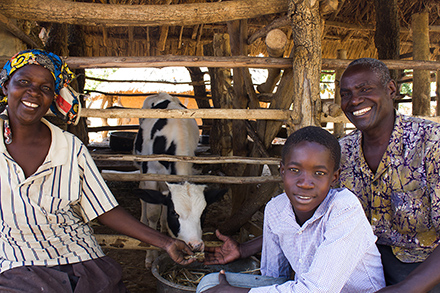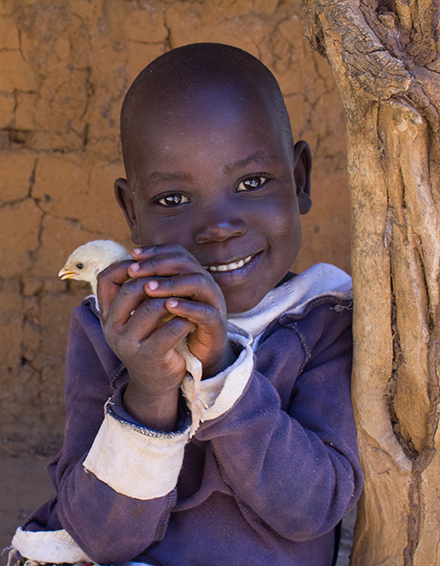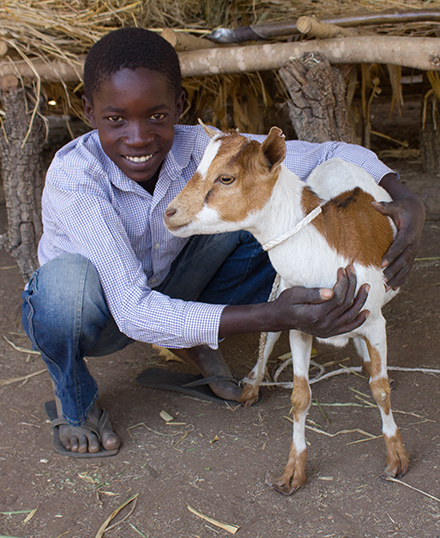Lawrence Oluka, 66, and his wife Bessy, 57, live in Asanuk Moru Village, Amuria District, in the Eastern Province of Uganda. The couple, who have 10 children and nine grandchildren, have survived through subsistence farming for decades. But, since joining the “Elder’s Concern Uganda” group in their village in 2013 and Heifer Uganda’s "Integrated Community Livelihood Support and Care Systems" project a year later, the family’s standard of living has dramatically improved.

The Oluka family received a heifer on February 17, 2014. Along with the animal, they were given napier and peanut seeds, vegetable seeds (onion, tomato, eggplant, carrot, and cabbage), and seeds for calliandra–a fodder crop. Lawrence and Bessy enthusiastically participated in Heifer’s trainings on topics including marketing vegetables, making nursery beds, composting, improved stoves, storing and preserving fodder, organic pesticides, crop husbandry, kitchen gardens, and Heifer’s 12 Cornerstones for Just and Sustainable Development.
Lawrence’s favorite Cornerstone is Improving the Environment. “It is my favorite because it helps to keep the environment cool,” he says. “I have kept these trees. I didn’t want to cut them and make charcoal.”
During the kitchen gardens training, the Olukas learned about double-dug and mandala gardens, composting and mulching. The new garden techniques have made their vegetable crops more abundant than before.
In honor of Earth Day April 22, help farmers like Lawrence and Bessy care for the Earth.

They also learned how to build storage rooms to protect their cassava, sweet potatoes, beans, cow peas, and rice. They put the food on platforms and spread sand, ash and chili powder on the floor to keep rodents away. Lawrence and Bessy share their personal storage room with three other families.
Thanks to manure, the Olukas have more fruits and vegetables to eat and sell. “There is a very big change,” says Lawrence. “After putting manure on my fruit trees, I was able to see an increase in the number and size.” He once harvested 110 pounds of fruit, but now he gets 200 pounds. With more crops, they have better nutrition and are able to earn extra income. Next on their wish list is a solar dryer, which will allow them to preserve the vegetables.
Lawrence also uses organic fertilizer, which is easier on the environment than traditional methods. “It is a good way for us to conserve soil and prevent erosion,” Lawrence continues.
Bessy and Lawrence have figured out how to cut less wood for cooking. Their new improved cook stove helps their wood lasts longer. They used to go through a large bundle of wood every four days, but now the same amount lasts two weeks. Lawrence continues to look for ways to reduce damage to the Earth. “I am interested in putting in a biogas plant,” he says. “That would save the destruction of our forests.”

Lawrence is proud of this project and wants to share it with others. “A number [of people] have copied this project. They learned from me,” he says. His house is often used as a training center, and so far, he has helped train 10 groups.
Bessy was trained to make and use the more fuel-efficient stoves. To date, she has trained five other women. In her 25-member women’s group, Bessy builds stoves and gardens. Together, they have a nursery with onion seedlings that are now ready to be transplanted.
The Olukas know that training goes both ways; they are always learning from their neighbors, too. Lawrence recently gave 10 gallons of cow urea to a friend who used it to make a natural pesticide. He had such great results that Lawrence is saving more so he can use it on his orange trees.
As Lawrence and Bessy’s life continues to improve, they find happiness in teaching others farming methods that are both effective and good for the Earth. And they thank Heifer and its donors for the kindness they have shown to their country.
Story by Christian DeVries
Photos by Katya Cengel